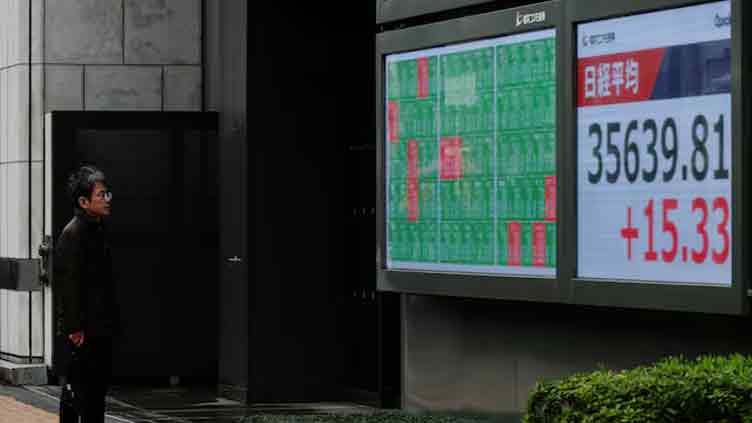Shares bruised as Trump tariffs stir recession fears

Business
Overnight S&P 500 companies lost a combined $2.4 trillion in stock market value
Wall Street's main indexes suffered their biggest one-day percentage losses since 2020 on Thursday
SINGAPORE (Reuters) - Stocks limped to the end of the week on Friday while gold flirted with a record peak as investors feared U.S. President Donald Trump's sweeping tariffs would tip the global economy into a recession.
Asian shares struggled to recover their heavy losses from the previous session as Japan's Nikkei (.N225) fell 1.85%, extending its 2.8% slide from Thursday.
MSCI's broadest index of Asia-Pacific shares outside Japan (.MIAPJ0000PUS) dipped 0.26% in thin trade, with markets in China, Hong Kong and Taiwan closed for a holiday.
Overnight S&P 500 companies lost a combined $2.4 trillion in stock market value, their biggest one-day loss since the coronavirus pandemic hit global markets on March 16, 2020, while other Wall Street indexes similarly clocked sharp falls.
The bruising selloff across markets came after Trump on Wednesday announced Washington's steepest trade barriers in more than 100 years, sending investors scrambling for safety assets.
"If the current slate of tariffs hold, a Q2 or Q3 recession is very possible, as is a bear market," said David Bahnsen, chief investment officer at The Bahnsen Group.
"The question is, does President Trump seek some sort of off-ramp for these policies if and when we see a bear market in the stock market. We believe Trump will then pivot to focus on the number of companies that are making significant investments in the U.S., but it's unclear that would reverse market sentiment."
U.S. stock futures steadied in the early Asian session, with Nasdaq futures rising 0.05%, while S&P 500 futures eased 0.06%.
Wall Street's main indexes suffered their biggest one-day percentage losses since 2020 on Thursday, the day after President Donald Trump's Liberation Day.
Reflecting the heightened worries of a global recession, particularly in the United States, traders have since ramped up bets of more Federal Reserve rate cuts this year, on the view that policymakers would have to ease more aggressively to shore up growth in the world's largest economy.
Fed funds futures now point to roughly 96 basis points worth of cuts by December, from closer to 70 bps shortly before Trump's tariffs were announced on Wednesday.
"Central banks are not well-equipped to deal with stagflation as the impacts of slower growth and higher inflation pull policy in opposing directions," said David Doyle, head of economics at Macquarie Group.
"This means that stronger core inflation is likely to limit the extent of any policy response from the Fed due to the headwinds created for growth."
Fed Chair Jerome Powell is due to speak later on Friday and investors will be looking out for his latest assessment of the U.S. economy and any clues on the policy outlook following Trump's fresh tariff salvo.
Elsewhere, spot gold was perched near a record high at $3,112.81 an ounce, and was on track for a fifth straight weekly gain, as worries about the impact of Trump's tariffs on the global economy boosted the metal's safe-haven appeal.
Oil prices extended their steep decline from the previous session, with Brent futures down 0.13% at $70.05 a barrel, while U.S. West Texas Intermediate crude futures fell 0.15% to $66.85 per barrel.



